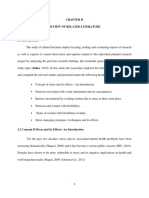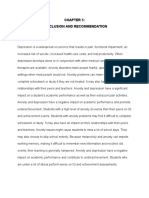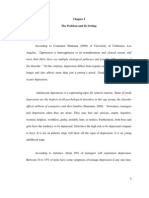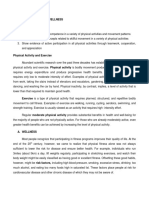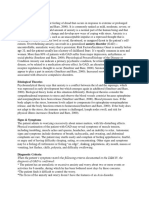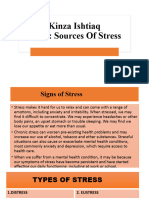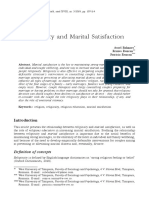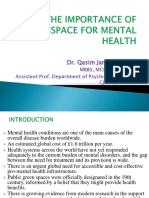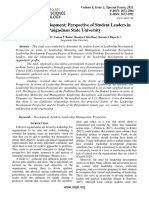The Importance of Mental Health
The Importance of Mental Health
Uploaded by
Rayden AlphaCopyright:
Available Formats
The Importance of Mental Health
The Importance of Mental Health
Uploaded by
Rayden AlphaOriginal Description:
Copyright
Available Formats
Share this document
Did you find this document useful?
Is this content inappropriate?
Copyright:
Available Formats
The Importance of Mental Health
The Importance of Mental Health
Uploaded by
Rayden AlphaCopyright:
Available Formats
The Importance of Mental Health
Mental health is very important at every stage of our life, from childhood and
adolescence through adulthood and even until we get old. Mental health is the state of
an individual who is functioning at a satisfactory level of emotional and behavioral
adjustment. It affects how we think, act and feel. Also, it helps to determine how we
handle stress, relate to others, and make choices. Over the course of your life, if you
are experiencing mental health problems, your thinking, mood, and behavior could be
affected in many significant ways. The three main factors that can affect our mental
health include our emotional, psychological, and social well-being. Our emotional,
psychological, and social well-being have different variables that contribute to mental
health problems, which are biological factors such as genes, or brain chemistry, life
experiences such as abuse, and family history of mental health problems. That is why
the importance of mental health is the main topic of this essay.
When it comes to our mental health, our emotional well-being plays a big part. Our
emotional well-being consists of being confident, optimistic, and able to cope with the
ups and downs of life. Anger, resentment, fear, anxiety, and frustration are emotional
states that a lot of people can experience regularly but try to avoid as much as
possible. If an individual keeps having negative emotions this can affect their mental
health in the long run. These negative emotional states can create extra stress in your
body and mind that can lead to health issues if the stress becomes chronic or
overwhelming. If an individual is emotionally suffering then physical health can
suffer too. For example, research shows that emotional distress creates susceptibility
to physical illnesses like digestive disorders (gastrointestinal problems), sleep
disturbances, and general lack of energy. It can even increase susceptibility to viral
infection, and stress from lack of control in the workplace or from life events which
can even create susceptibility to cardiovascular disease. The implications of decreased
emotional well-being are related to mental health concerns such as stress, depression,
and anxiety. Sadness and anxiety are normal emotions that help alert us to, protect us
from, and cause us to react, which is in fact absolutely healthy but What is not healthy
is when these feelings become excessive, ongoing, irrational, distressing, and interfere
with our daily life.
You might also like
- Grade 3 Detailed Lesson Plan MathematicsDocument4 pagesGrade 3 Detailed Lesson Plan Mathematicsjaceheron89% (178)
- Lesson Plan Gr. 9 Life Orientation Term 1 Week 1 & 2Document4 pagesLesson Plan Gr. 9 Life Orientation Term 1 Week 1 & 2jeno43% (7)
- Places That Matter: Knowing Your Neighborhood through DataFrom EverandPlaces That Matter: Knowing Your Neighborhood through DataNo ratings yet
- Two Schools of Thought in Communication StudiesDocument3 pagesTwo Schools of Thought in Communication StudiesDelenzy Cino80% (5)
- WCCHC Behavioral Health Training ProgramsDocument28 pagesWCCHC Behavioral Health Training Programsjordyn1990No ratings yet
- Psychological First AidDocument2 pagesPsychological First AidReynante Solitario100% (1)
- Review of Related LiteratureDocument28 pagesReview of Related LiteratureporseenaNo ratings yet
- Write Down The History of Abnormal Psychology in Renaissance PeriodDocument12 pagesWrite Down The History of Abnormal Psychology in Renaissance PeriodKashish GautamNo ratings yet
- Positive Psychology InterventionsDocument7 pagesPositive Psychology InterventionsSitaramNo ratings yet
- Dissertation - Sleep and Anxiety in StudentsDocument21 pagesDissertation - Sleep and Anxiety in Studentslitchickuk100% (1)
- Upper Intermediate: KeynoteDocument3 pagesUpper Intermediate: KeynoteLexieNo ratings yet
- Healthy Lifestyles 2Document15 pagesHealthy Lifestyles 2Habib KhaishgiNo ratings yet
- Defining Mental Health and Mental IllnessDocument13 pagesDefining Mental Health and Mental IllnessNaufal PradiptaNo ratings yet
- Thesis WorkDocument25 pagesThesis Workapi-314559956No ratings yet
- Consent FormDocument1 pageConsent FormEjay P. JuadaNo ratings yet
- Psychology ProjectDocument7 pagesPsychology Projectsai indiraNo ratings yet
- Counseling Theories Final PaperDocument11 pagesCounseling Theories Final Paperapi-334628919No ratings yet
- MultimodalDocument51 pagesMultimodalRidzwan AfiffuddinNo ratings yet
- Chapter 5 Depression and AnxietyDocument2 pagesChapter 5 Depression and AnxietyChristian VillaNo ratings yet
- Thesis - EnglishDocument17 pagesThesis - EnglishKyle Cayaban100% (1)
- Reserach Paper 2Document13 pagesReserach Paper 2api-329166706No ratings yet
- Types of DisabilitiesDocument26 pagesTypes of DisabilitiesJian B.No ratings yet
- Outcomes Map Mental HealthDocument16 pagesOutcomes Map Mental HealthMayniarAyuRahmadianti100% (1)
- The Importance of Mental Health AwarenessDocument2 pagesThe Importance of Mental Health AwarenessGalih PutraNo ratings yet
- Research Paper 1 2Document12 pagesResearch Paper 1 2api-549249381No ratings yet
- Living With Depression & Coping StrategiesDocument20 pagesLiving With Depression & Coping Strategiesnatasharf100% (1)
- Rational Emotive Behaviour Therapy: Presented By: Aditi Solanki Supervised By: Dr. Rajeev DograDocument90 pagesRational Emotive Behaviour Therapy: Presented By: Aditi Solanki Supervised By: Dr. Rajeev Dograanon_560094392100% (1)
- What Is Psychoanalytic Therapy: Dream Interpretation: According To Freud, Dream Analysis Is by Far TheDocument2 pagesWhat Is Psychoanalytic Therapy: Dream Interpretation: According To Freud, Dream Analysis Is by Far Thebuhari rabiuNo ratings yet
- Stress Is Like Spice-In The Right Proportion It Enhances The Flavour of A DishDocument38 pagesStress Is Like Spice-In The Right Proportion It Enhances The Flavour of A DisheinsteinNo ratings yet
- Assignment On Theories of EmotionDocument8 pagesAssignment On Theories of EmotionAhmad A. ArabiNo ratings yet
- PFT ManualDocument20 pagesPFT ManualCriziaClaire CosmeNo ratings yet
- Child Abuse and Its Impact On Students' Psychological Well Being in NDU MunicipalityDocument19 pagesChild Abuse and Its Impact On Students' Psychological Well Being in NDU MunicipalityEditor IJTSRDNo ratings yet
- What Is Self-ActualizationDocument2 pagesWhat Is Self-ActualizationMalak Kinaan100% (3)
- Als Self Esteem Survey QuestionnaireDocument2 pagesAls Self Esteem Survey QuestionnaireGerry BaylonNo ratings yet
- When The Patient's Symptoms Match The Following Criteria Documented in The DSM-IV, The Diagnosis of GAD Is ConfirmedDocument30 pagesWhen The Patient's Symptoms Match The Following Criteria Documented in The DSM-IV, The Diagnosis of GAD Is ConfirmedDivine Burlas AzarconNo ratings yet
- PTSDDocument5 pagesPTSDapi-191694415No ratings yet
- What Is StressDocument3 pagesWhat Is StressRachel GasparNo ratings yet
- Dce 3712 Conflict Resolution PowerpointDocument51 pagesDce 3712 Conflict Resolution PowerpointZahirul HaqNo ratings yet
- What Is Psychological First Aid?Document4 pagesWhat Is Psychological First Aid?Jianica SalesNo ratings yet
- Internet Addiction (TLE)Document25 pagesInternet Addiction (TLE)April PalamosNo ratings yet
- Sources of StressDocument27 pagesSources of StressmariaNo ratings yet
- Emotion Focused CopingDocument8 pagesEmotion Focused CopingMahrukh KhalidNo ratings yet
- Role of Religiosity and Psychological Well BeingDocument11 pagesRole of Religiosity and Psychological Well BeingCynthia Torres-GonzálezNo ratings yet
- Discussion Substance AbuseDocument1 pageDiscussion Substance Abuseapi-454324937No ratings yet
- Cognitive Perspective by Albert EllisDocument5 pagesCognitive Perspective by Albert EllisshaistaanumpsychologistNo ratings yet
- Religiosity and Marital SatisfactionDocument9 pagesReligiosity and Marital SatisfactionPeter MissoleNo ratings yet
- Do You Follow InstructionsDocument17 pagesDo You Follow InstructionsscornelioNo ratings yet
- Mental Health Month 2022Document32 pagesMental Health Month 2022kicaanuNo ratings yet
- Research Proposal PosterDocument1 pageResearch Proposal Posterapi-310193189No ratings yet
- 8.1 Discuss A Case Conceptualization For BPS Factors and CRSJ Considerations That Contribute To Anxiety and Depression in AdolescenceDocument4 pages8.1 Discuss A Case Conceptualization For BPS Factors and CRSJ Considerations That Contribute To Anxiety and Depression in AdolescencehibasaleemmNo ratings yet
- Behavioral Family TherapyDocument6 pagesBehavioral Family Therapyiulia9gavrisNo ratings yet
- Poverty and Health MattersDocument1 pagePoverty and Health MattersGeo StellarNo ratings yet
- Worker StressDocument5 pagesWorker StressMinagaFathmaSonnayaNo ratings yet
- Brain Mechanisms of HungerDocument23 pagesBrain Mechanisms of HungerDevika RajanNo ratings yet
- Mental Health and Green SpaceDocument20 pagesMental Health and Green SpaceQasim ChacharNo ratings yet
- Adjustment of Special PopulationDocument9 pagesAdjustment of Special PopulationAbdul LatifNo ratings yet
- What Are PhobiasDocument8 pagesWhat Are PhobiasAida NasrinNo ratings yet
- Let's Explore How Sad Sadness Is: A Journey Through The Abyss of DepressionDocument12 pagesLet's Explore How Sad Sadness Is: A Journey Through The Abyss of DepressionStephanie Ann ValenciaNo ratings yet
- Self Esteem FinalDocument7 pagesSelf Esteem Finalkashfiachowdhury100% (1)
- Self-Efficacy: Helping Children Believe They Can SucceedDocument4 pagesSelf-Efficacy: Helping Children Believe They Can SucceedBalamurugan RangaraajanNo ratings yet
- Research PaperDocument5 pagesResearch Paperapi-325979936100% (1)
- Emotional DevelopmentDocument27 pagesEmotional DevelopmentSherli P100% (1)
- Personal Theory of CounselingDocument15 pagesPersonal Theory of Counselingapi-252727551100% (1)
- SELF ReflectionDocument10 pagesSELF ReflectionDenis MuindeNo ratings yet
- 271-Article Text-759-1-10-20230723Document10 pages271-Article Text-759-1-10-20230723Camille D. BravoNo ratings yet
- The Benefits of Pets For Human Health: Psychology and Behavioral ScienceDocument3 pagesThe Benefits of Pets For Human Health: Psychology and Behavioral ScienceEden Ben HamoNo ratings yet
- Changes in College Student Endorsement of ADHD Symptoms Across DSM EditionDocument12 pagesChanges in College Student Endorsement of ADHD Symptoms Across DSM EditionRaul Morales VillegasNo ratings yet
- 1 - Q1 PerDevDocument18 pages1 - Q1 PerDevRANYAH GANDARUZANo ratings yet
- Wild Shape Guide: Beast Shapes Level Max. CR Limitations ExampleDocument21 pagesWild Shape Guide: Beast Shapes Level Max. CR Limitations ExampleRichard GuthNo ratings yet
- Intro ResearchDocument2 pagesIntro Researchthiên ngân trầnNo ratings yet
- Engaging (For) Social Change - TowardsNew Forms of Collective ActionDocument321 pagesEngaging (For) Social Change - TowardsNew Forms of Collective ActionDrti DrtkoNo ratings yet
- 04 PPT To Student Perception and Individual Decision MakingDocument29 pages04 PPT To Student Perception and Individual Decision MakingTouleen AkoumNo ratings yet
- Personality: Am I Happy With My Personality ?Document1 pagePersonality: Am I Happy With My Personality ?Hoshi MartinezNo ratings yet
- The 90-Day Prosperity ExperimentDocument3 pagesThe 90-Day Prosperity Experimentcarl100% (1)
- Collab HK Lore AnalysisDocument38 pagesCollab HK Lore AnalysisRubén GutiérrezNo ratings yet
- To The Young Women of Malolos Appendix C, Report Number 36,37,38Document39 pagesTo The Young Women of Malolos Appendix C, Report Number 36,37,38Melito Lampago VillariasNo ratings yet
- Activity 1Document5 pagesActivity 1Borj YarteNo ratings yet
- Return of The Subject in Late FoucaultDocument5 pagesReturn of The Subject in Late FoucaultMannoel MottaNo ratings yet
- Not at All Rarely Sometimes Often Very OftenDocument2 pagesNot at All Rarely Sometimes Often Very OftenШабохина АннаNo ratings yet
- Realism and Behaviorism ModuleDocument11 pagesRealism and Behaviorism ModuleKri de AsisNo ratings yet
- Jay - Architect (INTJ) PersonalityDocument7 pagesJay - Architect (INTJ) PersonalitySandy NicNo ratings yet
- Chapter 5 Report of JimenezDocument22 pagesChapter 5 Report of JimenezWendelyn JimenezNo ratings yet
- Group 3 Research 11 Stem 2Document6 pagesGroup 3 Research 11 Stem 2Tian AndamNo ratings yet
- Supervisory ProgramDocument6 pagesSupervisory ProgramSilven Planteras DigamonNo ratings yet
- Eng G8 Q4 Module 3 1Document8 pagesEng G8 Q4 Module 3 1TJ JovesNo ratings yet
- Habit Reversal Training and Acceptance and Commitment Therapy For Tourette Syndrome: A Pilot ProjectDocument12 pagesHabit Reversal Training and Acceptance and Commitment Therapy For Tourette Syndrome: A Pilot ProjectJuan Alberto GonzálezNo ratings yet
- Session Guide LTR Reading Remediation Tool VangieDocument4 pagesSession Guide LTR Reading Remediation Tool VangieJovie SumalilingNo ratings yet
- LET-MIXED-GenEd ProfEd Notes LecturesDocument5 pagesLET-MIXED-GenEd ProfEd Notes Lecturessilvagerald.pmsiNo ratings yet
- Emotional Intelligence and Achievement Motivation Among College StudentsDocument3 pagesEmotional Intelligence and Achievement Motivation Among College StudentsEditor IJTSRDNo ratings yet







